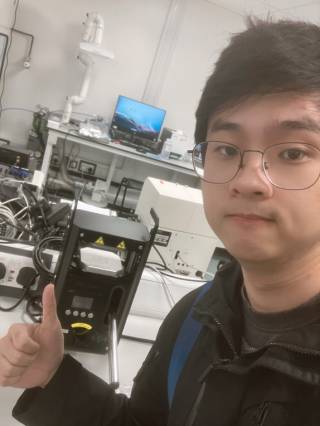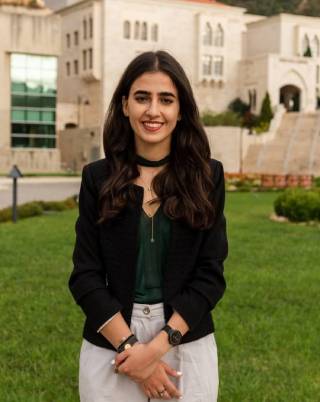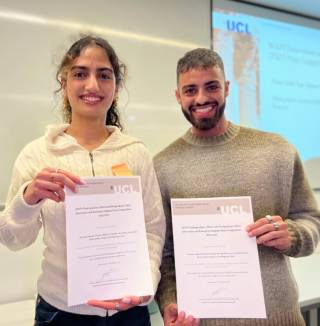MAPS 2023 Postgraduate (MSc) Innovation & Enterprise Competition Prize Winners Announced
15 December 2023
Many congratulations to Yichen Lang, Racha Doumit, You Zuo and the team comprising Sunaan Malik, Rea Sachdeva, Boyi Pang, Ruijing Han, Yancheng Shen, Hang Yu and Wangxing Cheng, winners of the 2023 MAPS Faculty Postgraduate (MSc) Innovation and Enterprise Prize Competition.

Postgraduate (MSc) Innovation and Enterprise Prize Competition
The MAPS I&E team is thrilled to wrap up the year by revealing the winners of The Postgraduate (MSc) Innovation and Enterprise prize competition 2022/23. This competition is designed to prompt students to reflect on the impact of their research projects. It encourages them to consider the entrepreneurial aspects of their work and to identify ways in which it could genuinely benefit society.
The recipients of the MSc prize category, along with winners from other I&E student prize categories, were honoured with certificates during the MAPS Faculty Awards Ceremony on 13 December 2023.
Yichen Lang – Institute for Materials Discovery
“Revolutionizing Smart Food Packaging: High strength, Non-permeable Edible Containers”
Dr. Shahab Akhavan, as Yichen’s supervisor, expressed his joy at Yichen receiving the MAPS Innovation and Enterprise prize for his master research project, saying:
“Yichen's project focused on Smart Food Packaging, aiming to combat plastic pollution, an idea conceived and proven in our lab.
Each year, vast amounts of plastic and food packaging waste harm our environment, releasing harmful chemicals. These pollutants affect our soil, water, and food chain. Recycling costs compound the issue, making waste management a challenge.
Yichen's solution offers durable, impermeable containers—an innovative, sustainable way to reduce waste and protect our ecosystem. This award serves as a strong motivator for Yichen and aspiring students, encouraging an entrepreneurial mindset. Moreover, it boosts the commercialization of our lab-developed product, already showcased to potential investors.”
In response to being awarded the prize, Yichen said:

“I'm thrilled to receive this prize after the hard work and challenges throughout my research project. Successfully showcasing our product prototype makes me confident that more time invested could pay off in its commercialization.
Meeting my supervisor, Dr. Shahab Akhavan, has been an honour. His guidance and encouragement have been invaluable; our relationship feels more like that of friends than just supervisor and student.
The research period will undoubtedly stand out as the highlight of my time at UCL, if not my entire academic journey. This prize boosts my motivation and entrepreneurial spirit, elevating my confidence in pursuing this venture".
Racha Doumit – Institute for Risk and Disaster Reduction
"Reimagining the Beirut Blast, a counterfactual analysis assessing Disaster Risk Management (DRM) policies”
Dr Roberto Gentile, Racha’s supervisor, conveyed his satisfaction at Racha being awarded this prize for her master research project:
“As a Lecturer in Crisis and Catastrophe Risk Modelling, my initial impression of Racha's research mindset was marked by its maturity and depth. Her ability to seamlessly navigate between qualitative desktop studies, in-person data collection, and probabilistic risk modeling showcases a sophisticated mix of engineering and social science skills.
The innovative use of upward counterfactual analysis in Disaster Risk Management (DRM) policy assessment is a noteworthy contribution, which holds substantial applicability. Her study not only identifies weaknesses in existing disaster governance structures but also proposes carefully curated corrective policies, quantifying their potential impact through a robust probabilistic analysis. The suggestions from Prof Gordon Woo, worldwide expert in counterfactual analysis, are greatly appreciated.
I commend Racha not only for her academic achievements but also for her commitment to addressing real-world challenges. Her work has the potential to influence DRM policy, contributing to a lower-risk future and, ultimately, a safer world for all. I am proud to have been part of her journey and excited to see the positive impact her work will undoubtedly have in the field of disaster risk management.”

“To me, August 4 was an eerie near miss, one that often left me pondering “What if?”. For the past three years, my reasoning dragged me into downward spirals, imagining the worst possible scenarios. This study was the first time I thought of the blast in an upward manner. My question turned into: “What if we could do things differently?” Reimagining the Beirut Blast stemmed from this inquiry, presenting an innovative approach to DRM policy assessment through upward counterfactual analysis.
By revisiting the tragic Beirut Blast, I retrospectively identified shortcomings in the disaster governance structure; introduced carefully curated corrective policies (i.e., upward counterfactuals); conducted probabilistic analysis to quantify their impact; provided actionable recommendations for enhancing DRM.The approach combined hard and social sciences, offering a data-driven scrutinization tool to adjust policies and advocate for safer societies. The tool’s versatility lies in its applicability to diverse context and the advocacy for tangible disaster policy reform.
Winning this award is my way of paying tribute to the victims of state neglect, mismanagement of risk, and corruption. The MAPS competition has encouraged me to consider a scale-up of the project: it will mark the beginning of a long journey toward data-driven policy advocacy for a safer world".
Sunaan Malik, Rea Sachdeva, Boyi Pang, Ruijing Han, Yancheng Shen, Hang Yu and Wangxing Cheng – Institute for Materials Discovery
“The development of a functionalised biopolymeric graphene oxide water filter for sustainable and efficient water purification"
Dr Mojtaba Abdi Jalebi, the team’s supervisor, commented:
"It brings me great joy to witness my students being honoured with this award, recognizing their collaborative efforts in the ‘Real World Applications and Exploitations’ module. Their groundbreaking solution has the power to transform the water purification industry, presenting a sustainable alternative that excels in longevity and efficiency. Collaborating with such a dynamic and innovative group, showcasing out-of-the-box thinking and a true passion for entrepreneurship, has been incredibly fulfilling.
It was truly delightful collaborating with this group of highly motivated MSc students who demonstrated exceptional enthusiasm, innovative thinking, and a keen interest in entrepreneurship. I extend my sincere gratitude to the MAPS Innovation and Enterprise team for spearheading this fantastic initiative. Their efforts have successfully inspired students to consider the entrepreneurial dimensions of their projects and research, exploring potential opportunities for real societal impact."
In response to being awarded the prize, Sunaan, one of the team members stated:

“We are thrilled to win this award, not just as a recognition of our hard work but a validation of our device's potential to revolutionize access to clean water. The critical state of global water scarcity and the toll it takes on human life propelled us to innovate. Our device isn’t just a product; it's a beacon of hope for the 2.6 billion people facing water vulnerability. By creating a filter that not only purifies but retains essential minerals, we've addressed a fundamental need for both improved health and environmental sustainability.
The learnings from our project extend beyond technical skills; they encompass a realization of our potential to effect tangible change. Dr. Mojtaba Abdi Jalebi's vision—'Innovation with a Conscience'—guided our quest to develop a technology that benefits all, particularly the underprivileged. The exposure to the grim realities of water pollution sharpened our resolve to make a difference.
This award validates our belief in the project's commercial viability and its socio-economic benefits. The competition was a collaborative and intensive learning experience, compelling each of us to leverage our strengths and think creatively to overcome challenges. This experience has been instrumental in sculpting our professional ethos and will undoubtedly influence our future endeavours. This project has been a transformational chapter in our lives, instilling a profound understanding of our role as innovators in society's progress and environmental preservation.”
You Zuo –Department of Physics and Astronomy
“Transfer Learning for Short-Term Photovoltaic Generation Forecasting with Deep Neural Networks”
You’s supervisor, Dr Nikos Nikolaou said:
“I was delighted to hear that You received the MAPS Innovation and Enterprise prize. You’s project focussed on deep learning models for photovoltaic (PV) power generation forecasting. In particular, he explored the application of transfer learning methods for improving the quality & efficiency of the PV power prediction on a new PV plant, using a model trained on one or more existing similar plants. This successful proof-of-concept, novel in the literature, opens the way for easier (faster, more computationally efficient, more precise & robust) integration of new PV plants -yet to collect much data- into the existing power grid."

“Reflecting on my research project on short-term photovoltaic (PV) power generation forecasting using deep learning methods, I feel fortunate to have had the opportunity to explore this challenging yet fascinating area. The project aimed to address a common issue in PV power integration, particularly the difficulty of predicting PV generation for new plants with limited data. By employing transfer learning methods, I attempted to adapt models trained on extensive data from established plants to new plants with sparse data.
Participating in the MAPS competition has been a profound learning journey. The experience has been vital in enhancing my understanding of both the technical aspects of machine learning and PV forecasting, as well as the broader context of their application in solving real-world energy challenges."
 Close
Close

